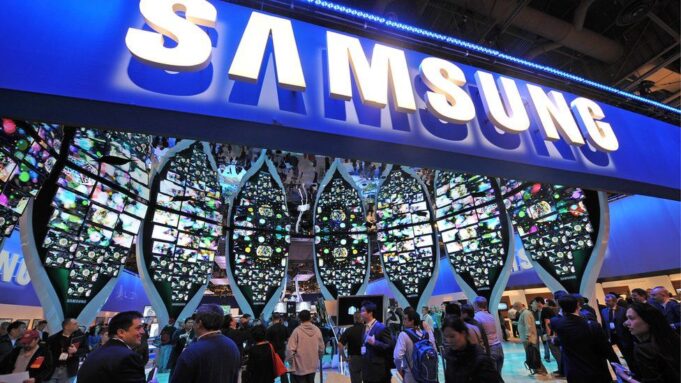Workers at South Korean tech giant Samsung, on Monday, July 8, 2024, commenced a three-day general strike over pay and benefits.
The head of a union representing Samsung workers, Son Woo-mok, confirmed this on Monday, warning the action could impact memory chip production.
Samsung Electronics is the world’s largest memory chip maker and accounts for a significant chunk of the global output of high-end chips.
Wearing rain jackets and ribbons saying “fight with solidarity”, thousands of workers gathered outside the company’s foundry and semiconductor factory in Hwaseong, Gyeonggi, an hour south of Seoul.
Samsung management has been locked in negotiations with the union since January, with the two sides failing to narrow differences on benefits and a rejected 5.1 per cent pay raise offer from the firm.
Woo-mok, head of the National Samsung Electronics Union, said: “The strike has started from today.
“Today’s general strike is just the beginning.”
“Recalling why we are here, please do not come to work until July 10th and do not receive any business calls,” he told the crowd of Samsung workers.
Tinubu to Samsung: Nigeria, best place for tech investment
The union said about 5,200 people from factory facility, manufacturing and development had joined the protest.
“Do they still not think this will affect their production line?” said Lee Hyun-kuk, vice president of the union.
The union, which has more than 30,000 members, or more than a fifth of the company’s total workforce, announced the three-day general strike last week, saying it was a last resort after talks broke down.
The move followed a one-day walkout in June, the first such collective action at the company, which went decades without unionisation.
“I’m really excited. We’re making history,” one union member and protester told AFP.
Samsung workers rejected the offer of a 5.1 per cent pay hike in March, with the union having previously outlined demands, including improvements to annual leave and transparent performance-based bonuses.
Samsung declined a request for comment.
Samsung Electronics avoided its employees unionising for almost 50 years – sometimes adopting ferocious tactics, according to critics – while rising to become the world’s largest smartphone and semiconductor manufacturer.
Company founder Lee Byung-chul, who died in 1987, was adamantly opposed to unions, saying he would never allow them “until I have dirt over my eyes”.
The first labour union at Samsung Electronics was formed in the late 2010s.
The firm is the flagship subsidiary of South Korean giant Samsung Group, by far the largest of the family-controlled conglomerates that dominate business in Asia’s fourth-largest economy.
It recently predicted a 15-fold increase in its on-year second-quarter operating profits, thanks to growing demand for generative AI.
Semiconductors are the lifeblood of the global economy, used in everything from kitchen appliances and mobile phones to cars and weapons.
Demand for the advanced chips that power artificial intelligence systems has skyrocketed thanks to the success of ChatGPT and other generative AI products.
Semiconductors are South Korea’s leading export and hit $11.7 billion in March, their highest level in almost two years, accounting for a fifth of South Korea’s total exports, according to figures released by the trade ministry.
- Yuletide: Abuja residents groan as FCTA imposes tax in restaurants, eateries - December 27, 2024
- Adeleke appoints Adesuyi Haastrup as Owa Obokun of Ijesha, Abikoye as Asaoni of Ora Igbomina - December 27, 2024
- Lagos Imam to Tinubu: You’ve not disappointed us - December 27, 2024










